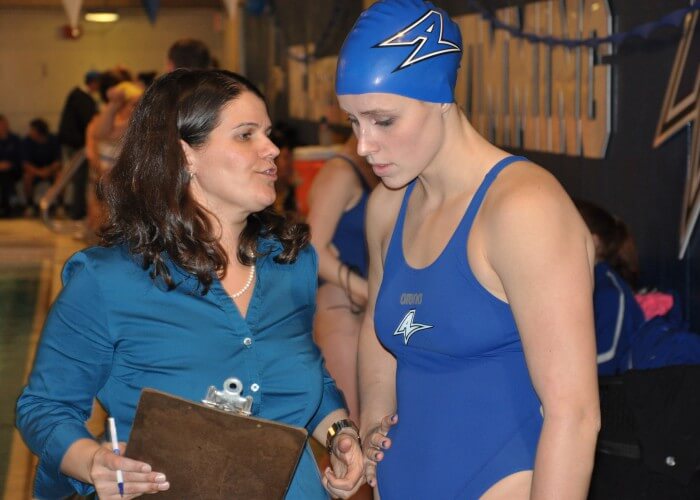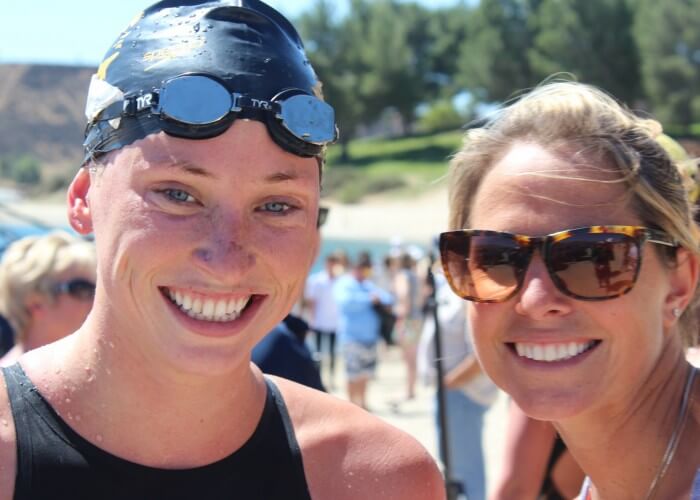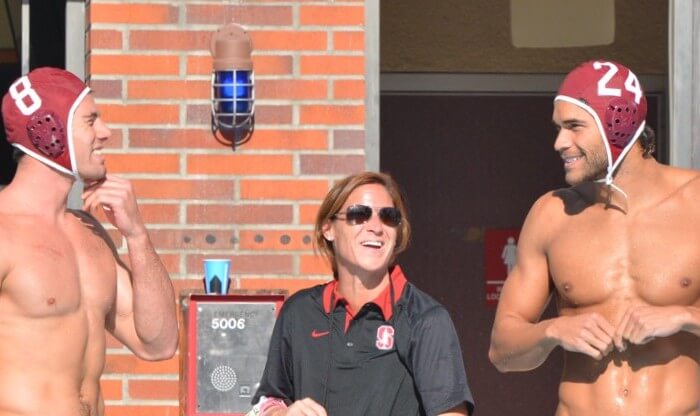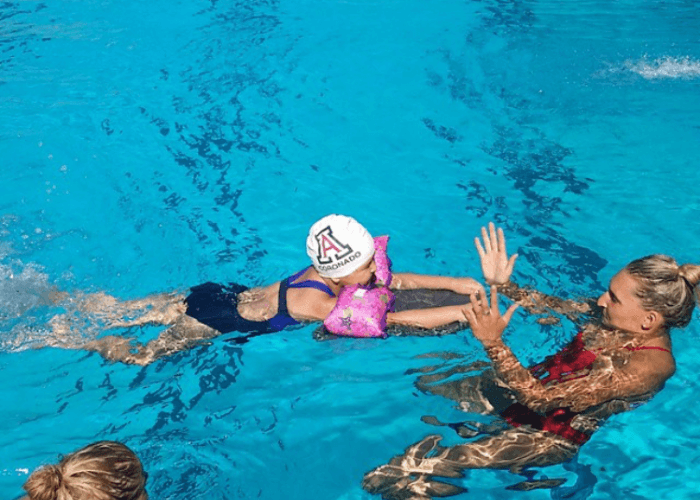The Importance of Female Coaches
By Emma Foster, Swimming World College Intern
This January, the Buffalo Bills made the news with reports of their hiring the first full-time assistant female coach in the NFL. Kathryn Smith was brought on this year as a special teams coach for the Bills. Her hiring set off a wave of reactions, with many applauding the decision. Smith noted in a statement that the attention was “extraordinary” but that her focus was fixed on leading her team to victories.
Smith’s hiring, and the reactions it generated was noteworthy not merely for football fans. Smith’s contract comes in a string of appointments of women made in typically male-dominated sports across the country– with women finding jobs as full time NBA assistants, NFL officials, and Major League teams. This movement is a critical piece to bringing women into sports and creating space for them not only as athletes but as coaches, officials, and administrators.
In the swimming world, which is full of female athletic superstars such as Katie Ledecky, Missy Franklin, Simone Manuel, and many others, sometimes it is easy to forget about inequality that is often perpetuated within the sports world concerning opportunities for women. However, when it comes to the amount of women in college coaching positions, swimming can be doing better. In a 2015-2016 report released from the Alliance of Women Coaches and Tucker Center for Research on Girls and Women in Sport, Swimming received an ‘F’, meaning that the number of female head coaches was less than 24 percent (swimming scored 15.6 percent) at NCAA Division I FBS schools.
In a sport that has so many opportunities to challenge gender conventions and offer a space for women, this report is disappointing. While the report was only looking at schools with football teams, which does not cover all colleges that offer swimming, and did not take into account female coaches in Division II, III and NAIA, it does offer a snapshot of the number of women in a leading coaching position, and that number is not impressive.
Often in sports there are conversations explaining women’s lack of involvement in coaching with excuses such as the idea that women are simply not involved on the athletic level, and thus aren’t interested in coaching (this is often used with football). However, anyone with knowledge of swimming and awareness of the many female superstars in the sport can recognize that this is simply not the case. There is something that is making it more difficult for female coaches to be successful in terms of achieving and maintaining high level positions at college institutions.
The easiest answer to this question is a matter of social conditioning. Even in the second decade of the 21st century, women are predominantly expected to shoulder the burden of housework and childcare, something that is often difficult with any job, but particularly challenging within a coaching lifestyle. With odd hours, and high travel months, women often feel that their coaching career has to take a backseat to their family. In other cases, women are sometimes taught at a very early age that they will not be successful in environments that require confrontation and leadership. When little girls are conditioned to believe that coaching is a man’s world, and that they are too emotional to handle players that would talk back and confront them, it is of little surprise that they do not grow up wanting to be coaches.
Changing the Attitude

Photo Courtesy: Peter H. Bick
In the swimming world, there are a number of very successful, strong women who are challenging the status quo. Perhaps one of the reasons these women found their role in coaching has to do with the sport of swimming itself as an opportunity to reexamine the expectations that are set for women in sports.
Heidi Voigt, Northern Michigan University’s head coach, spoke to me about her experience as a female head coach and specifically addressed this issue. Coach Voigt commented that swimming offers a unique experience for male and female athletes in that growing up training together (and with the reality that girls often beating boys throughout their lives…hello, Katie Ledecky) a bond forms where male swimmers learn a deep respect for their female teammates’ abilities. Coach Voigt noted that swimming leaves nothing to hide, spending your day in a swim suit, almost naked, breaks down barriers and allows kids to develop relationships outside of the typical male/female dynamic.
Voigt offered a story to crystalize this point, explaining that she had the opportunity to coach a male/female distance duo that were relatively evenly matched. She explained that this gave them both an opportunity to train together, which they loved, and out of their partnership developed a great respect. That is something Coach Voigt said she was proud to see, and reflects an environment in swimming that is unique to the sport.
Who Looks Like the Coach?

Photo Courtesy: Elizabeth Lykins
While there may be a more inclusive attitude within the sport, work still needs to be done to translate that into the coaching world. While overall Coach Voigt feels that she is not questioned in her role because of her gender, she also notes that she is currently the only female coach in her conference.
For the most part, she says that she “doesn’t feel a difference on deck” being the only female, but sometimes there are “weird things” that remind her of the cultural stereotype that women should not be in the head coach’s role. She explained that sometimes, when she is at a pool where she doesn’t know the other coaches or officials, her male assistant coach is mistaken for the head coach, or is the one given the bill when the team is out to dinner. While Coach Voigt notes that her assistant is “amazing” in these situations, telling whoever has made the mistake to “Go talk to Heidi,” the moments are also a reminder of the assumption that a male coach would be the one in charge.
This is an experience shared by Elizabeth Lykins, who is the University of North Carolina, Asheville head coach. Coach Lykins has had the unique opportunity of building UNCA’s program from the ground up since its inception in 2012, and has been involved in the process of building the traditions and attitudes of the team since the beginning. While she also feels that she has largely had only positive experiences as a head coach, with a male assistant she also found that there was sometimes a case of mistaken identity.
Coach Lykins commented that “when we went to restaurants or hotels, often the staff assumed my assistant was the head coach.” What she made sure to note was that these interactions were outside of the swimming community. “It wasn’t my assistant treating me differently, but the staffing at places we visited as a team.”
However, Coach Lykins also notes that recruiting has been a place where she has felt some backlash due to her gender.
“The place where I’ve noticed my gender most being disrespected is in recruiting. In general, most head club coaches are willing to speak with me and be honest concerning the swimmers I am recruiting. However, a few males act as though I’m not worth their time.”
In contrast, Coach Voigt felt that sometimes the fact that she is a woman has helped her in recruiting, in particular with international athletes. She explains that many of the international swimmers she has recruited have been coached by women, and attributes their comfort with her to that. She also believes that a woman can seem more comforting; someone who will act as a “parental figure” for parents worried about sending their offspring off to college for the first time. This is something Coach Voigt understands– feeling that in many ways she is some sort of third parent. She notes “For me, I can relate to my athletes like ‘What if this was my son?'”
This characteristic is certainly a great attribute that some female coaches can bring to the table, but it is also wrong to assume that just because someone is a woman she is naturally more motherly and gentle. In fact, both Coach Voigt and Coach Lykins note that they are the more stern coaches in their staff. For Coach Lykins, being emotional isn’t a part of her coaching style.
“I personally don’t feel the need to be motherly or emotional due to my gender,” Lykins said. Female coaches, like women in general, are more than just one stereotype.
For Coach Lykins this is an important point. She has found that one key difference she feels within the athletic community is an assumption from those above her who see her role as a coach as someone who is there to provide a “positive student athlete experience” rather than winning. Coach Lykins feels that conversations like these reflect a difference from how her male counterpart might be approached. She argues that, “While the experience IS extremely important, I don’t like to be assumed as non-competitive.”
What Do the Athletes Say?

Photo Courtesy: Daily News of Open Water Swimming
For both these coaches, there have been moments with athletes where they have felt they have been challenged because of their gender. When Coach Voigt was an assistant coach at the University of Wyoming, she felt that at first, her distance group was “a little bit unused to being coached by a woman.” But they quickly turned around. Now, as the leader of NMU, Coach Voigt had the opportunity to bring back men’s swimming after its cut in 1980. Working with 20 men, Coach Voigt notes that she hasn’t had “one negative interaction.”
On the other side of the coin, Coach Lykins sometimes sees an attitude from female swimmers that expect to be friends with their female coaches in a way that she doesn’t necessarily witness between men and their female swimmers. Coach Lykins notes that finding a way to ensure the integrity of the coach-swimmer relationship is important in order to make sure that just because a head coach is a woman she doesn’t lose authority with her athletes.
For Catherine Vogt, the longtime USC assistant coach and US Open Water head coach for the 2016 Olympics, being the best coach she can be, regardless of gender, has always been the focus. She has had very little negative reactions in her history of coaching due to her being a woman, and notes that she has “never not felt competent” purely because she was a woman.
While there may have been challenges, she didn’t let them get in the way of what she knew she could do. She once had a male swimmer who told her he didn’t want to swim with her because she was a woman. She explained that at the time, “It didn’t even phase me. I look back and think it was a good thing; I was naïve, competitive, and was able to compartmentalize.” Without letting the comment bother her, Coach Vogt won her athlete over and in the end had a great story to show for it.
“He ended up being one of my closest friends upon graduation and was really successful– competing at the NCAAs two years in a row,” Vogt said.
The Double Burden

Photo Courtesy: Lea Maurer
For many female coaches, although there may be stereotypes and opinions that they must surmount within the coaching world, they find themselves able to change minds and challenge conventions as they go. One thing that continues to be an obstacle rests in the issue of family, and women finding time for coaching within the structure of their family life. This is a question that affects men as well, but has predominantly been viewed as the responsibility of women throughout societal history.
For Lea Maurer, former head coach of the Stanford women’s team, this was an issue that ultimately led to her stepping back from coaching.
Coach Maurer remarks that she loved coaching. As a married woman with kids, coaching a top five DI program, she wanted to provide a model for young women in the sport and in coaching that “you can do it all.” She has been a tremendous role model, but is the first to admit that it hasn’t been an easy road. “I think you can do it all, and it’s getting better,” she noted, but she also has kids that are swimmers. With travel meets for both her career and her kids’ swimming careers, she was faced with a choice.
“I give 100 percent to whatever I do and it wasn’t possible to give that to my young kids as a parent, to my husband, and to my team. It was an incredibly hard choice. I think women coaches, men coaches, administrators, the NCAA, need to come together and look to discover how to help everyone (but in particular women) find a way to share ways that they found balance and success.”
For Maurer, it’s not just about being a mother either. “Every woman is a daughter, granddaughter, maybe a sister, aunt and always a friend to other women. These roles require more of us than they do of our male counterparts.”
One suggestion she offers is that instead of waiting until the last minute to announce international coaching staffs, selecting them well before the meet so coaches with children can line up a babysitter and plan in advance for the prolonged absence from their families. Small changes like this, and other forms of conscious effort to ease the double burden that comes with being a parent and coach are moves Maurer believes will help keep women in the profession, something that she is certain is valuable for both male and female athletes.
As for anyone who would claim that appointments such as Smith’s to the Bills team are “token” hires meant only to attract media attention. Maurer offers a different perspective:
“If anyone thinks those hires in the NFL or NBA are ‘token hires’ I would tell them, ‘Wait and see– I think it is a really smart choice.’ Women bring a unique perspective. We understand women athletes, and for men, we offer a different perspective– innovative ideas or approaches.”
Moving Forward

Photo Courtesy: Arizona Swimming and Diving
Understanding the status of our sport is important because it allows us to do better. As all the female coaches I reached out to made sure to point out, having women in coaching positions is valuable for everyone. As more women are expressing interest and looking at the ways in which conventions can be challenged to provide more space for female coaches, programs are being put in place to establish support. From female specific coaching clinics, to luncheons that offer women a chance for shared community, there is a growing awareness that by supporting women in coaching, we are supporting the growth of swimming in general.
We can, and must, keep pushing. As football celebrates its first female coach, let’s make sure we are leading the way to making sure that even more are invited into the sports world. As any swimmer knows, this sport is incredibly difficult but can be exceedingly rewarding. We need all the voices and perspectives available to ensure that each athlete gets the most out of their time in the water.




Barbara Aguirre
The LL League (PA) is blessed w many quality female coaches!
We are not just 8 and under coaches..:-)
Great Article thank you for this. I have been a Coach (Female) for 16yrs now and have been Head Coach of My own private club for 4 now. I am so blessed to have this opportunity, have an amazing husband that supports me and 3 wonderful daughters that are all swimmers as well. Yes it’s tough for women to be We may not got paid much but what we get out of it coaching is worth way more than $. Women have so much passion and dedication towards their sport, and don’t just look at it as a job like most of our counterparts. It’s not just and opportunity to jump the ladder in status quo, but a real opportunity to make a difference in kids lives, communities, families and our love for the sport!
Vamos que se puede!!!! A seguir trabajando ?
I like how it mentions interest. If you want to do something, simply do it
Go Camilla Lenzi Go!!!!!
Lindsay Swiderski-Taggart..so glad you rescued Reese! We love where we are now and so happy to be here!
Ema Fuentes ??
Good!!!
Kim-Marie Torres
Gaby Ekkelboom, etwas langer text, aber die überschrift sagt ja schon alles ?
Alena Cemalovic
Selly Selly
Jen Noel ♡
I was late once on poolside by a few minutes (only happened once in 12 years) and the head coach had a go at me, even though I had apologised profusely as soon as I stepped out, I had also phoned a fellow coach who,was starting my squad. I did point out as well as working full time, I had also had to cook dinner for a family, hang out some washing and actually I was late because the kitchen flooded. He however, had come home from work, eaten his dinner cooked by wife, got in his car and come to training. Often women have to do a little bit more than men to take up volunteer coaching positions and this does put some off!
I coach a HS Boys team, and have been the head coach with a male assistant for 10 years. Last year I had an athlete who had been swimming with me for 4 years watch another female head coach walk across the pool deck. He turns to me and says “It is so weird to see a female head coach. It doesn’t seem right for girls to coach boys teams.” I looked at him funny and it took him a few moments to realize that *I* was a female head coach coaching a boys team. His response was “You’re not a girl, you’re just coach.”
Couldn’t agree more!
Carlene Takaki & Marisa Watts Cozort